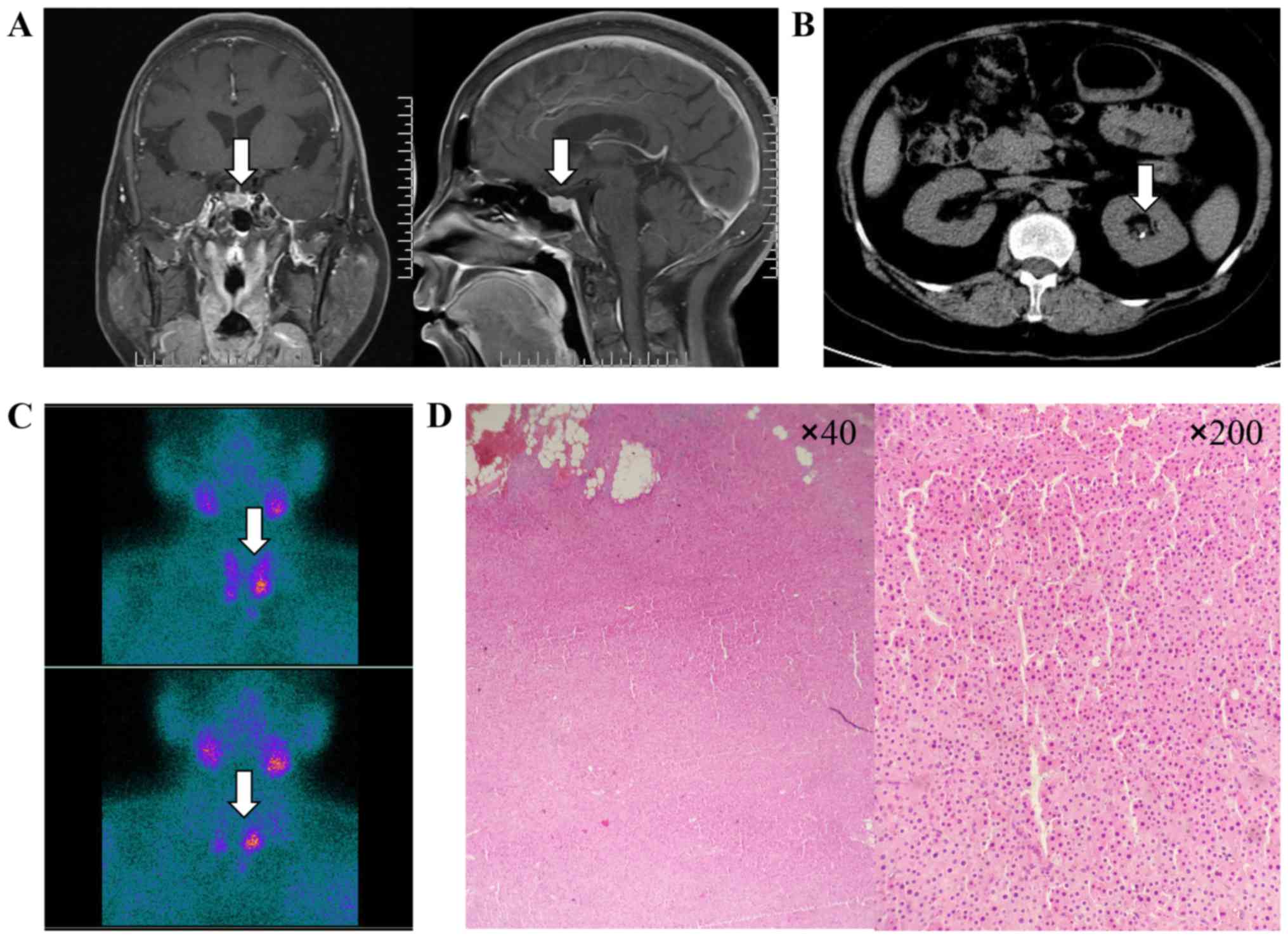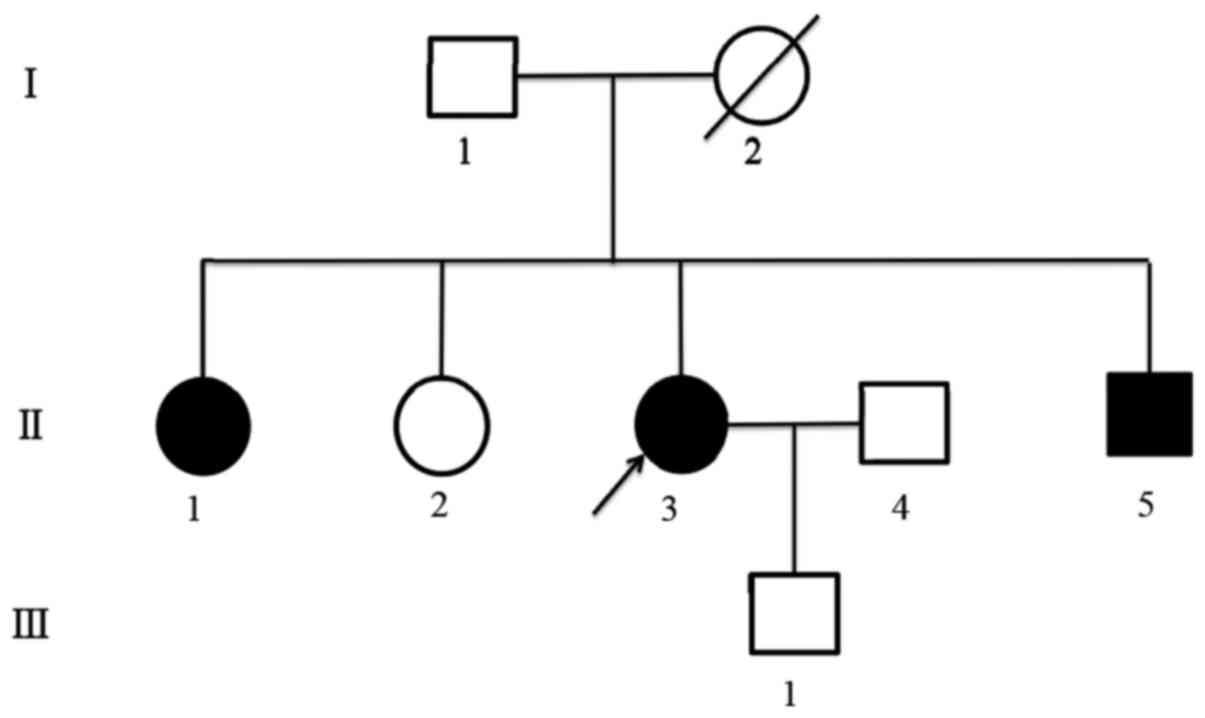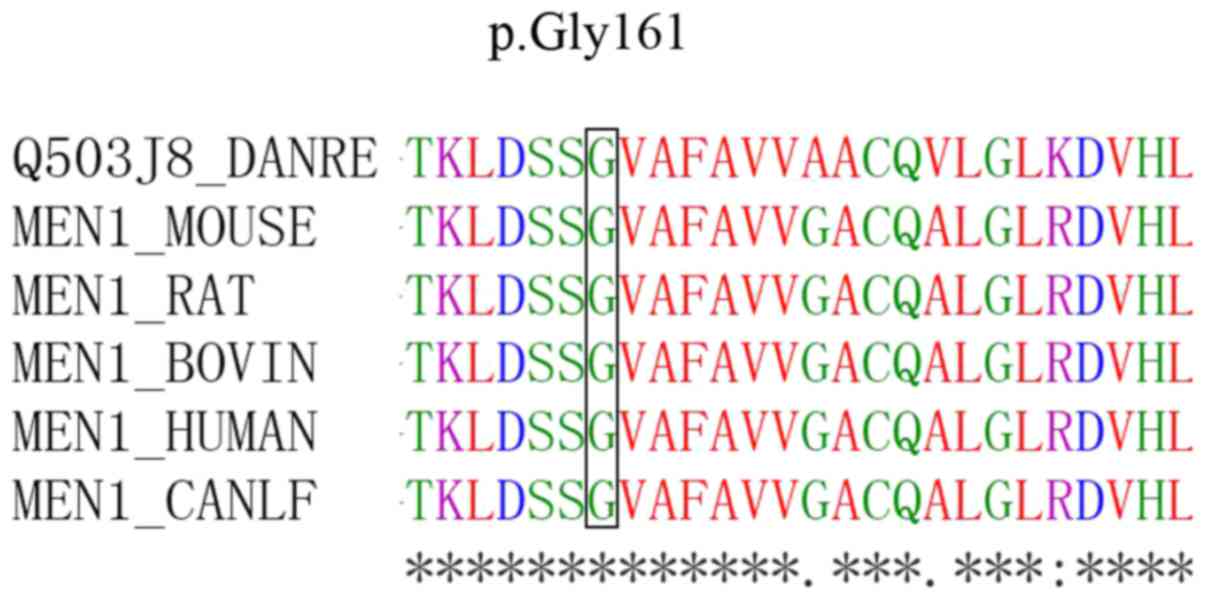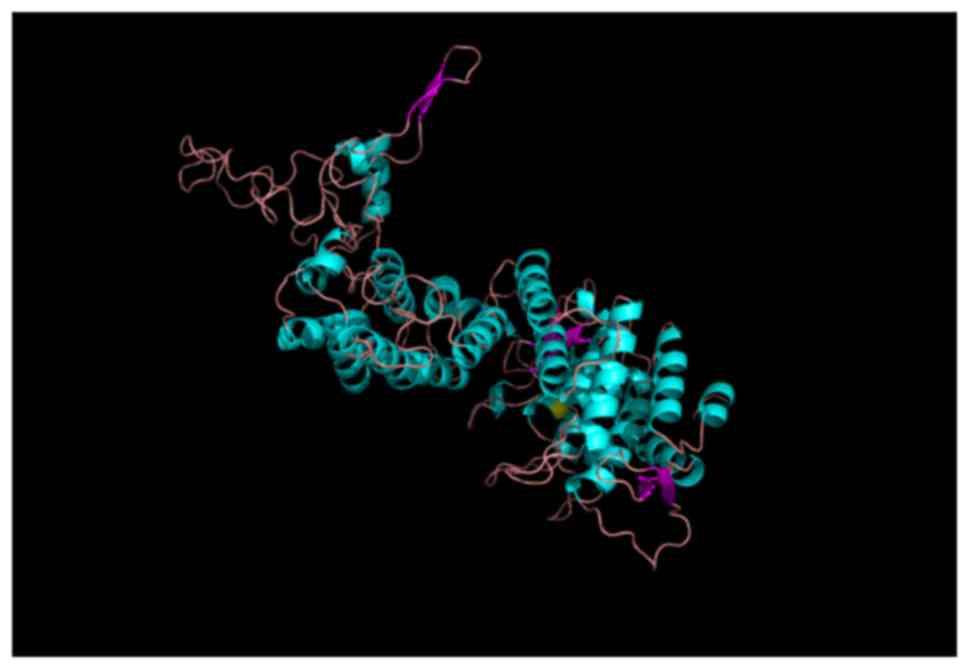|
1
|
Lemos MC and Thakker RV: Multiple
endocrine neoplasia type 1 (MEN1): Analysis of 1336 mutations
reported in the first decade following identification of the gene.
Hum Mutat. 29:22–32. 2008. View Article : Google Scholar : PubMed/NCBI
|
|
2
|
Chandrasekharappa SC, Guru SC, Manickam P,
Olufemi SE, Collins FS, Emmert-Buck MR, Debelenko LV, Zhuang Z,
Lubensky IA, Liotta LA, et al: Positional cloning of the gene for
multiple endocrine neoplasia-type 1. Science. 276:404–407. 1997.
View Article : Google Scholar : PubMed/NCBI
|
|
3
|
Concolino P, Costella A and Capoluongo E:
Multiple endocrine neoplasia type 1 (MEN1): An update of 208 new
germline variants reported in the last nine years. Cancer Genet.
209:36–41. 2016. View Article : Google Scholar : PubMed/NCBI
|
|
4
|
Stewart C, Parente F, Piehl F, Farnebo F,
Quincey D, Silins G, Bergman L, Carle GF, Lemmens I, Grimmond S, et
al: Characterization of the mouse Men1 gene and its expression
during development. Oncogene. 17:2485–2493. 1998. View Article : Google Scholar : PubMed/NCBI
|
|
5
|
Mutch MG, Dilley WG, Sanjurjo F,
DeBenedetti MK, Doherty GM, Wells SA Jr, Goodfellow PJ and Lairmore
TC: Germline mutations in the multiple endocrine neoplasia type 1
gene: Evidence for frequent splicing defects. Hum Mutat.
13:175–185. 1999. View Article : Google Scholar : PubMed/NCBI
|
|
6
|
Guex N, Peitsch MC and Schwede T:
Automated comparative protein structure modeling with SWISS-MODEL
and Swiss-PdbViewer: A historical perspective. Electrophoresis. 30
Suppl 1:S162–S173. 2009. View Article : Google Scholar : PubMed/NCBI
|
|
7
|
Thakker RV, Newey PJ, Walls GV, Bilezikian
J, Dralle H, Ebeling PR, Melmed S, Sakurai A, Tonelli F and Brandi
ML: Endocrine Society: Clinical practice guidelines for multiple
endocrine neoplasia type 1 (MEN1). J Clin Endocrinol Metab.
97:2990–3011. 2012. View Article : Google Scholar : PubMed/NCBI
|
|
8
|
Guru SC, Goldsmith PK, Burns AL, Marx SJ,
Spiegel AM, Collins FS and Chandrasekharappa SC: Menin, the product
of the MEN1 gene, is a nuclear protein. Proc Natl Acad Sci USA.
95:pp. 1630–1634. 1998; View Article : Google Scholar : PubMed/NCBI
|
|
9
|
Huang J, Gurung B, Wan B, Matkar S,
Veniaminova NA, Wan K, Merchant JL, Hua X and Lei M: The same
pocket in menin binds both MLL and JUND but has opposite effects on
transcription. Nature. 482:542–546. 2012. View Article : Google Scholar : PubMed/NCBI
|
|
10
|
Agarwal SK, Guru SC, Heppner C, Erdos MR,
Collins RM, Park SY, Saggar S, Chandrasekharappa SC, Collins FS,
Spiegel AM, et al: Menin interacts with the AP1 transcription
factor JunD and represses JunD-activated transcription. Cell.
96:143–152. 1999. View Article : Google Scholar : PubMed/NCBI
|
|
11
|
Pfarr CM, Mechta F, Spyrou G, Lallemand D,
Carillo S and Yaniv M: Mouse JunD negatively regulates fibroblast
growth and antagonizes transformation by ras. Cell. 76:747–760.
1994. View Article : Google Scholar : PubMed/NCBI
|
|
12
|
Thevenon J, Bourredjem A, Faivre L,
Cardot-Bauters C, Calender A, Murat A, Giraud S, Niccoli P, Odou
MF, Borson-Chazot F, et al: Higher risk of death among MEN1
patients with mutations in the JunD interacting domain: A Groupe
d'Εtude des Tumeurs Endocrines (GTE) cohort study. Hum Mol Genet.
22:1940–1948. 2013. View Article : Google Scholar : PubMed/NCBI
|
|
13
|
Kaji H, Canaff L, Lebrun JJ, Goltzman D
and Hendy GN: Inactivation of menin, a Smad3-interacting protein,
blocks transforming growth factor type beta signaling. Proc Natl
Acad Sci USA. 98:pp. 3837–3842. 2001; View Article : Google Scholar : PubMed/NCBI
|
|
14
|
Sowa H, Kaji H, Canaff L, Hendy GN,
Tsukamoto T, Yamaguchi T, Miyazono K, Sugimoto T and Chihara K:
Inactivation of menin, the product of the multiple endocrine
neoplasia type 1 gene, inhibits the commitment of multipotential
mesenchymal stem cells into the osteoblast lineage. J Biol Chem.
278:21058–21069. 2003. View Article : Google Scholar : PubMed/NCBI
|
|
15
|
Knudson AG Jr: Mutation and cancer:
Statistical study of retinoblastoma. Proc Natl Acad Sci USA. 68:pp.
820–823. 1971; View Article : Google Scholar : PubMed/NCBI
|
|
16
|
Luzi E, Marini F, Giusti F, Galli G,
Cavalli L and Brandi ML: The negative feedback-loop between the
oncomir Mir-24-1 and menin modulates the Men1 tumorigenesis by
mimicking the ‘Knudson's second hit’. PLoS One. 7:e397672012.
View Article : Google Scholar : PubMed/NCBI
|
|
17
|
Falchetti A: Genetic screening for
multiple endocrine neoplasia syndrome type 1 (MEN-1): When and how.
F1000 Med Rep. 2:pii: 142010.
|



















